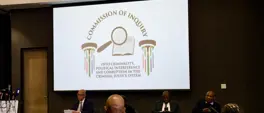DR LULU GWAGWA | The representation of the youth in decision-making is a developmental imperative
Dr Lulu Gwagwa
25 June 2025 | 12:37As Youth Month events and dialogues continue, lets us intentionally step forward in solidarity to accelerate action to unlock the full potential of young people, especially young women, to contribute meaningfully to a thriving and equitable society.

Woman empowerment, business. Pexels/Mikhail Nilov
The month of June holds great significance in the history of South Africa, not only as a commemoration of the class of 1976 that brought the apartheid regime to its knees, but as a moment of reflection on the strides that we have made in empowering young people.
Over the past few days, several media outlets and social media have been abuzz with discussions led by young people about the state of youth in our country.
On Youth Day, the 16th of June, as the government hosted events to commemorate the day, young people were expressing their thoughts on the new dispensation. I followed these discussions with keen interest, listening to their experiences of a democracy that was so hard-won.
While there were some positive stories about the progress that the country is making in empowering the youth, there were even more stories of disappointment and debilitation.
Millions of young people in South Africa have been hurled at the margins, excluded not only from the economy by the high rate of youth unemployment, which is among the highest in the world, but also from decision-making in both the public and private sectors. The statistics are sobering.
The total number of employees in the South African Public Service is 1,260,630, with approximately 349,618 of these employees are considered youth. This represents about 27% of the total public service workforce and is below the target that the government has set to have 30% youth representation in the public service.
But even more concerning is that young people in the public service are largely underemployed and constitute a significantly low percentage of middle and senior management.
In the National Assembly, where critical legislation is passed, the under-representation is especially staggering. A report released by the Parliamentary Monitoring Group on the 13th of June 2025 indicates that in South Africa’s 7th parliament, only 8.5% of the seats in the National Assembly are held by youth (defined as individuals aged 18-34).
This translates to only 33 out of the total 387 occupied seats. In the 6th parliament, there were 30 young people in the National Assembly, meaning that only 3 more have been added in the current administration.
The report indicates that the most populated age group in the National Assembly is the 45-54 age group, with 104 members of parliament (MPs) followed by the 55-64 age group, with 103 MPs. The number of MPs aged 65 and above, at 58, is almost twice the size of the youth.
At the time of writing of the report, the Parliamentary Monitoring Group could not confirm the data for the National Council of Provinces (NCOP). While specific numbers on youth in leadership positions within South Africa's private sector are not readily available, what can be gleaned from the composition of senior management in Johannesburg Stock Exchange (JSE) listed companies is telling. Young people are almost non-existent.
In academia, the pattern is also similar, with young people struggling to transition into middle management positions even with adequate skills, experience and qualifications.
The work of University of Johannesburg academic, Professor Mlamuli Hlatswayo, on the impediments of progression that post-doctoral fellows are confronted with in South Africa’s higher education, speaks to the systematic failures of capacity-building in what is undoubtedly the most critical sector for any country’s development.
The exclusion of young people in the labour force and in decision-making is not an oversight. It is an indictment on our leadership in both the public and private sectors. The youth constitute a large portion of the working population in South Africa and the broader African continent.
According to the United Nations (UN), Africa has the youngest population in the world, with 70% of sub-Saharan Africa under the age of 30. The UN also estimates that in 2050, Africa will have over 830 million youth - more than doubling the current population of young people. This significant increase will position Africa as a continent with the world's largest youth population and a substantial contributor to the global workforce.
The cost of youth under-representation in the leadership of South Africa’s public, private and civil society sectors is incalculable. Involving young people in leadership and decision-making is not merely a question of justice and inclusion, but one that is vital for economic growth, human development, innovation, peace and security.
In my work at Traversing Liminality, a dynamic platform that aims to facilitate interactions and mutual learning for young African women while encouraging contributions to the community, I have come to appreciate the value that the youth in general, and young women in particular, if seen and appropriately supported, can bring to institutions and society broadly.
Their progressive thinking around solutions to the continent’s problems, socio-economic and otherwise, is desperately needed in public and private institutions that have the task of building our society. To exclude them from decision-making is to trap our country in a perpetual cycle of under-development and instability.
There is a direct link between this exclusion and the high levels of instability that we are seeing in our communities. The high levels of crime, including gender-based violence, are a symptom of the systematic failure to empower both young women and young men. Research by various scholars draws parallels between the rise in youth-led community protests on issues ranging from water insecurity to poor service delivery across the board and youth exclusion in the economy and decision-making.
As Youth Month events and dialogues continue, lets us intentionally step forward in solidarity to accelerate action to unlock the full potential of young people, especially young women, to contribute meaningfully to a thriving and equitable society.
This requires strategic investments not just in technical skills, but most importantly, in self-mastery to ignite their agency and sense of self so that they can constructively and responsibly engage in shaping the future of their families, communities and society at large.
The public, private and civil society sectors can ill-afford to exclude young people in these processes. Youth empowerment is about supporting and giving young people responsibilities that shape institutional policies and objectives.
Empowerment is also about creating safe spaces for young people to learn and thrive. Unless this investment is prioritised, our developmental agenda as a country will not be fully realised.
Dr Gwagwa is an accomplished development planner, business leader, philanthropist and founder of Traversing Liminality.
Get the whole picture 💡
Take a look at the topic timeline for all related articles.

















